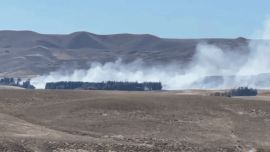Argentine farmers struggling to ship their crops through increasingly shallow rivers may soon face a new obstacle: one of the world’s key soy waterways needs to be dredged, and there’s no firm plan for who will do it.
The government in agricultural powerhouse Argentina has had months – even years – to draft the terms of a tender to dredge the Paraná River, the source of most of the world’s soy meal for livestock feed and soy oil for cooking and biofuels. But companies eying the new multi-year contract are still in the dark and, compounding the uncertainty, the man in charge of what exactly is up for grabs, ex-transport minister Mario Meoni, died in a car crash last week.
With the future of millions of tons of crop cargoes at stake, the turmoil couldn’t come at a worse time: Argentina’s soybean and corn harvests are in full swing, and the company holding the expiring contract is working overtime to keep the river channel deep enough for ships to load them as years of dry weather shallow out water levels.
Policymakers continue to work under instructions left by ex-minister Meoni, a spokesman for the Transport Ministry said in a phone message, declining to give more details.
The contract to dredge the river – from crop-export hub Rosario down to the estuary at Buenos Aires about 500 miles away – is currently held by Belgian company Jan de Nul in a partnership with Argentina’s Emepa. Jan de Nul and Emepa’s contract was set to expire on April 30, though the government published a last-minute resolution on Thursday extending it for 90 days. It’s unclear if that gives transport officials enough time to pull a tender together for bidders.
The partnership has dredged the Paraná since 1995, with the last contract extension signed in 2007.
Dredging the Paraná is worth around US$200 million a year in tolls. The recommendation by industry groups is for the new contract to last 15 years, which would mean revenues for the winner of US$3 billion.
To farmers and agricultural traders who ship 80 percent of Argentina’s crops down the Paraná, the waterway is worth a whole lot more: over US$20 billion a year in exports.
“We’re pretty worried because river navigation is imperative,” said Gustavo Idigoras, head of Argentina’s crop export and processing group Ciara-Cec, whose members include global agribusiness giants like Bunge Ltd, Cargill Inc and Glencore Plc.
Jan de Nul plans to bid for the new contract without Emepa, which has been embroiled in a corruption scandal. Other companies that have expressed an interest are China’s Shanghai Dredging Company, through local unit Servimagnus, Belgium’s DEME, and two Dutch companies, Van Oord and publicly-traded Boskalis, according to people familiar with the matter.
“We are glad that this concession has finally come up for tender and will not be extended again, so that we have a fair chance to bid here,” DEME said in an email.
None of the other potential competitors to Jan de Nul immediately replied to emailed requests for comment.
by Jonathan Gilbert, Bloomberg




















Comments